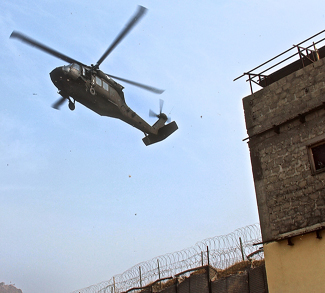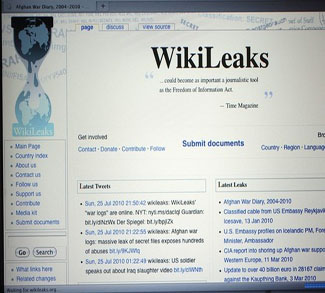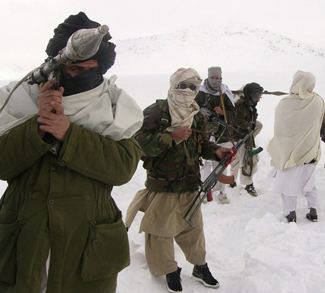FORECAST
Contrary to being a detached observer of the conflict in Georgia, Russian officials claim the US has incited the Georgian offensive in South Ossetia via years of military assistance and training. Such claims indicate how this regional conflict could mushroom from a proxy war into a direct clash between Russia and the US.
The claim was made during a Friday press conference in which Chairman of Russia’s State Duma Security Committee, Vladimir Vasilyev, stated that Georgia’s decision to retake the breakaway region of South Ossetia would not have been feasible without the belief that Georgia would have Western support.
Such belief has been bolstered by US aid dating back to 2002, under the auspices of the Georgia Train and Equip Program and the Sustainment and Stability Operations Program. The former was a $64 million program replete with 200 Special Operations Forces, light weapons, vehicles, and communications supposedly aimed at countering alleged Al Qaeda influence in the Pankisi Gorge; the operation ended in September 2007. The latter security assistance program, beginning in 2005, saw Georgia’s military capabilities augmented as it committed thousands of troops to the US-led multinational coalition in Iraq, making it the third largest contributor.
Combined with NATO’s courtship and flush with revanchism, the Caucasus country has been emboldened enough to conduct its military foray into South Ossetia. However, media reporting emphasizing Russia’s decision to counter the Georgian offensive has overshadowed US complicity and furthermore, has obscured what is truly at stake in the region for both superpowers.
Besides the self-determination of 70,000 South Ossetians who mostly possess Russian passports and have strong ties with the Russian territory of North Ossetia, at stake is a key oil pipeline in the region. The US and UK-financed $3B Baku-Tbilisi-Ceyhan (BTC) pipeline runs through Georgia from the Caspian Sea to markets in the West, allowing the West to reduce its dependency on Middle Eastern oil as well as supplies from Russia, especially since Russia has shown a willingness to shut off access during diplomatic disputes in recent years.
It is unlikely that the Russians would forcibly seize control of the pipeline, but the conflict’s potential to disrupt oil supplies and deter future investment in the region means that the US will ensure that its investment continues to reap benefits and that Georgia remains firmly under a Western sphere of influence. This means that the US will continue constructing its cordon sanitaire around a resurgent Russia via the extension of NATO membership to former Soviet bloc countries, as well as the establishment of its missile defence system in Central Europe.
Likewise, an affronted Russia will continue to respond to US encroachment in its backyard by flexing its muscles in a geopolitical game of chess from the Caspian to the Gulf of Mexico that may deter potential US allies and bolster US enemies. The end result will be more proxy wars reminiscent of the Cold War that could snowball into direct conflict between the two superpowers unless cool heads prevail.
Following the collapse of the Soviet Union, South Ossetia broke away from Georgian rule in a 1991-92 war and has since exercised de facto sovereignty but is not internationally recognized by any UN members.
On Thursday August 7, Georgian troops and warplanes attacked South Ossetian separatist forces in an offensive aimed at re-taking control of the breakaway region. On Friday August 8, Russia sent troops into South Ossetia to counter Georgian forces, fulfilling a vow to defend their secessionist “compatriots”.
Approximately 2000 civilians have been killed and thousands more displaced.
SUMMARY OF EVENTS: August 4 – 11, 2008
WORLD
Oil prices kept falling Tuesday, sinking as low as $118 a barrel on growing concerns that a U.S. economic slowdown and high energy costs are curbing consumer demand for gasoline and other petroleum products.
NORTH AMERICA
United States
The Pentagon on Monday said it was closing a controversial intelligence office that had raised concerns about domestic spying by the military after the September 11 attacks.
Two former CIA officers Tuesday denied that they or the spy agency faked an Iraqi intelligence document purporting to link Saddam Hussein with 9/11 bomber Mohammed Atta, as they are quoted as saying in a new book.
The Federal Reserve, confronted with the perils of a slumping economy and rising inflation, has decided for a second straight meeting to leave interest rates unchanged.
Troubled mortgage finance giant Freddie Mac on Wednesday reported a market-shocking loss in the second quarter as the US housing slump deepened and slashed its dividend at least 80 percent.
A military jury on Thursday sentenced terrorist chief Osama bin Laden’s ex-driver, Salim Hamdan, to 66 months in prison, far less than the 30 years prosecutors sought.
Struggling home finance giant Fannie Mae Friday reported a massive second-quarter loss of 2.3 billion dollars, more than three times analysts’ estimates.
SOUTH AMERICA
Bolivia
Bolivian President Evo Morales is expected to survive a recall vote this weekend but a political crisis in South America’s poorest country may intensify as right-wing opponents try to block his socialist reforms.
WESTERN EUROPE
Italy
The anti-gathering laws were enacted as thousands of soldiers were due to take to the streets of Italian cities for the first time on Monday under a controversial move by Prime Minister Silvio Berlusconi to fight crime.
EASTERN EUROPE
Georgia
The leader of Georgia’s rebel province of South Ossetia said on Wednesday that Georgia is planning a full-scale invasion of the region before the start of September.
Georgian President Mikheil Saakashvili said on Thursday he was prepared to enter into “any kind of talks,” in order to find a solution to the current Georgian-South Ossetian conflict.
Georgia will withdraw 1,000 soldiers from Iraq to help fight off Russian forces in Georgia’s breakaway region of South Ossetia, the head of Georgia’s Security Council, Kakha Lomaia, said on Friday.
Russia
Russia sent forces into Georgia on Friday to repel a Georgian assault on the breakaway South Ossetia region and Georgia’s pro-Western president said the two countries were at war.
MIDDLE EAST
Iran
Russia on Wednesday contradicted the United States and Britain, saying there was no agreement among six major powers on whether to pursue new U.N. sanctions against Iran for its nuclear program.
EAST ASIA
China
The 29th Olympic Games, costing an estimated 40 billion dollars and shrouded by political controversies, burst into life Friday with a spectacular opening ceremony.
The violence in the Western Chinese region of Xinjiang spiked sharply Sunday morning with the deaths of at least seven suspects after a daring series of bomb attacks that began with a predawn assault on a police station, the state news media reported.
North Korea
President Bush said on Wednesday that North Korea has much to do before the U.S. can remove it from the terror blacklist, but he raised hope that its pariah status as a member of the “axis of evil” could some day be a thing of the past.
The United States said on Friday North Korea had to make “substantial progress” on a verification plan for its nuclear weapons before being taken off a U.S. list of state sponsors of terrorism.
SOUTH ASIA
Pakistan
Pakistan’s ruling coalition will move to impeach President Pervez Musharraf on charges of plunging the country into a political and economic crisis, party leaders said on Thursday.
AFRICA
Mauritania
The leaders of a coup in Mauritania may have won the support of many local politicians but they face a tide of international outrage for ousting the desert nation’s first democratically elected president.
Rwanda
Rwanda has accused France of having an active, direct role in the African country’s 1994 genocide in which 800,000 people were killed.



